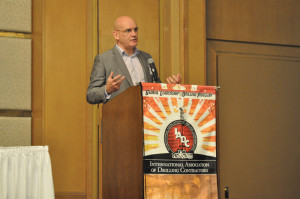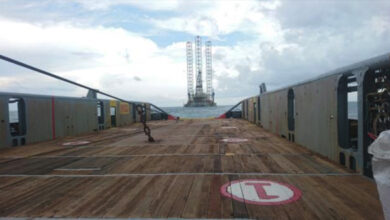IADC launches Well Control Institute
New industry body to develop single well control training/assessment standard for global drilling industry
By Amy Rose, IADC director of external relations

Preventing the unwanted release of hydrocarbons is the primary process safety concern at all stages of a well’s life cycle. Proper personnel training is an essential element in that prevention. On the eve of the 2013 IADC Well Control Conference of the Americas in Galveston, Texas, IADC president and CEO Stephen Colville announced the formation of the Well Control Institute (WCI), a new industry body that will provide a single, universal well control training and assessment standard for the drilling industry.
“The Well Control Institute is a cross-industry initiative to deliver a step-change in operational integrity and well control incident prevention,” Mr Colville said. “The goal is to develop a professional and consistent approach to ensuring the competence and credentials of everyone involved in all aspects of well control. By mid-2014, the WCI is expected to be fully operational, providing the industry a single administration and single governance, administering the single standard on well control.”
Opening the well control conference the following day, 2013 IADC chairman David Williams, chairman, president and CEO of Noble Corp, explained the impetus for developing the WCI. “We took a look at current well control training materials and programs and noted the existence of several areas for improvement. For example, the current model for testing and test development can be unreliable in quality and consistency. The focus of training can veer toward pass/fail, rather than knowledge retention. Training structure may not be sufficiently well-defined or appropriate,” he noted. “We looked at these and decided these challenges can be overcome, and more importantly, they should be overcome, for the good of our industry.”
The WCI will bring together all sectors of the drilling community to define and implement a new well control standard that will build on recommendations from the OGP Wells Expert Committee, the IADC WellCAP Advisory Panel, IWCF and other industry stakeholders.
“The Well Control Institute brings everybody together – operators, drilling contractors and service providers – and creates a mechanism where everyone can have input to develop the standard and get unified behind it,” said Andrew Frazelle, director, well control at BP. “We are moving this industry to a different place of competence so that we know that everyone on a rig is competent in what they are trained to do. Teaching our employees what they need to know and what is important and what is critical for success, so they can do their job the right way every time is critically important.”
The training and assessment standard developed by WCI will focus on learning and learning retention and will provide rig-role-directed learning objectives with an emphasis on kick detection and well shut-in. It will focus on the use of realistic simulations in a team environment and provide a reliable, secure and trusted testing process. The flexible curriculum will cover all well construction disciplines and specialized practices and will offer continuous opportunities for new learning with an enhanced frequency of assessment.
“The WCI is designed to ensure that people learn the critical things in their jobs first. We want them to do the critical things to prevent well control incidents. The result of the WCI is that every employee will understand this because there will be one standard that everyone is trained to,” said A.J. Guiteau, director, learning and development at Diamond Offshore Drilling. “In the future, we will be doing much more training in shorter periods of time around very basic and simple concepts and will be recertifying people just like the airline and nuclear industries. The WCI is a great step in the right direction.”
Supported by IADC technical committees, the WCI will draw from all segments of the industry to develop globally accepted well control training standards and governance. An independent Executive Board of Directors will provide the vision and mission and be responsible for the WCI’s strategy and tactical goals. The WCI Advisory Panel, also an independent body, will establish and maintain the standard and provide oversight of WCI operations and performance. Each of these will interface with IADC through the Administrative Body, which will include the WCI executive director and staff, who will be responsible for accrediting training providers and managing the day-to-day operations of the WCI. IADC is engaged in a search for an executive director of the WCI.
The WCI Board and Advisory Panel will each be comprised of representatives from operators, drilling contractors, well service providers and regulatory bodies.
Black and Veatch, a management consulting company, has been contracted to facilitate the setup of WCI’s structure. Over the next several months, it will be developing the WCI charter, outlining the management plan, implementing the WCI infrastructure and developing core documentation and operating procedures.
“When the WellCAP Advisory Panel and IWCF first came together, we discussed well control training and where it needed to be. We discovered that a standard was necessary, but is only one part. We needed to also address how the standard would be governed and how voices from across the world would be heard and how people would contribute,” said Cason Swindle, chairman of the panel and director of learning and development at Noble. “We also discussed how IADC could create the infrastructure to properly govern and administer the standard, and WCI was born out of that effort. The WCI is a place for the industry to come together to support, participate and engage actively.”
“The WCI is still under development. With the support of IADC’s memberships, most specifically our committee members, we look forward to moving ahead on the industry’s desire for a one world standard. We continue to invite all industry bodies to participate in this process. The WCI is envisioned as a collaborative effort to enhance well control training worldwide,” Mr Colville said. “This is yet another in a long series of IADC initiatives to drive up operational integrity for our industry by providing the tools necessary to ensure that every person on every rig has the proper training and credentials they need to perform their job.”
“IADC is the perfect home for this kind of institute because it has the membership that is active and engaged and participatory in ensuring that we have safe and productive employees across the world,” Mr Swindle said.





i like having computer base training for IADC
due to my work schedule i like having computer base training
Due to my work schedule IADC is preffered rather then class room training.
Are you guys nuts ? I can see stopping people with less than 15 years in industry from taking an online course and forcing classroom time. In Canada you have 2 types of second lines the regular 1 week one then if you score in 85% or better you get option on next course of a short version for my self I do IADC one year and IWCF the next been doing that for 12 years Now you want a week in school same as IWCF. Now I have to ask the real meat of the problem How many blowouts occurred with a computer trained well site supervisor verses Class room trained IADC or IWCF I am sure the numbers very low like almost zero
due to my work schedule and work in remote locations, i like having computer base training.
I also perfer the computer based training. We are required to take 3 different types of well control training. Two mandatory in classrooms and currently IADC optional classroom or computer. I agree anyone with ten years or more supervisor experience should be competent enough to take the computer based training.
Dear All
I am looking for IWCF course ( Supervisor Level ).
Please if you can help me in this.
Thanks
I like training well control methods (equipment handling and chock control ) using a dedicated well drilled and completed for well control training. In Roumania there is a well , 1300 m MD, that was drilled as training well. I should get more details.